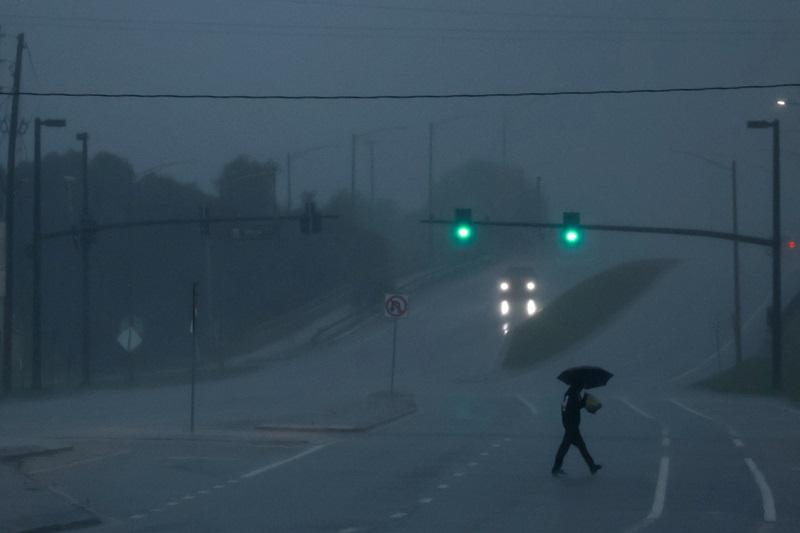Hurricane Milton bears down on Florida's west coast, millions flee

ST. PETERSBURG, Florida - An expanding Hurricane Milton closed in on Florida's west coast on Wednesday, spawning tornados and lashing the region with rain and wind hours ahead of its expected landfall near Tampa Bay, where it could deliver a life-threatening surge of seawater to waterfront communities already battered by Hurricane Helene.
As many as two million across Florida were ordered to evacuate, and millions more were directly in the projected path of Milton, which strikes just two weeks after Helene cut a swath of devastation through Florida and several other states.
Officials issued increasingly dire warnings on Wednesday as landfall, expected on Wednesday evening, drew closer.
Sarasota County Emergency Management Chief Sandra Tapfumaneyi said people who remain on the barrier islands in her county south of Tampa would likely not survive the storm surge.
"If you choose to stay, make sure you have a life preserver handy," she said during a CNN appearance.
Fueled by unusually warm waters in the Gulf of Mexico, the storm was set to hit the Tampa Bay metropolitan area, home to more than 3 million people.
At 5 p.m. EDT (2100 GMT), the eye of the storm was 60 miles (100 km) west-southwest of Sarasota, Florida, and moving to the northeast at 17 mph (28 kph), the U.S. National Hurricane Center said.
Tropical force winds had been striking the peninsula for hours.
While Milton slightly weakened on Wednesday afternoon to a Category 3 hurricane, the third-highest level, it was growing in size as it approached Florida and remained "an extremely dangerous major hurricane" with maximum sustained winds of 120 mph (195 kph), the National Hurricane Center said.
The storm could bring a surge of seawater as high as nine to 13 feet (2.7 to 4 meters) in some areas and dump six to 12 inches (150 to 300 mm) of rain, with as much as 18 inches (450 mm) possible in spots.
Milton was expected to maintain hurricane strength as it crossed the Florida peninsula, posing storm-surge danger on the state's Atlantic coast as well.
The National Weather Service confirmed at least a dozen tornadoes in Florida on Wednesday.
The four bridges spanning Tampa Bay were closed before the storm was due to make landfall, according to the Florida 511 website. Nearly everyone who decided to flee appeared to have done so, as most streets in nearby St. Petersburg were nearly deserted by midday on Wednesday.
Most causeways connecting the Gulf barrier islands to the mainland were also shut, stranding any who decided to ride out the storm despite pleas from officials.
In Orlando, many people said they had confidently ridden out previous hurricanes, but Milton's rapid intensification and warnings from officials spurred them into taking unusual precautions for the inland city.
Jim Naginey, a 61-year-old homeless man who has lived in Orlando for nearly three decades, said he had survived previous hurricanes on the streets. But he decided to seek shelter during Milton, joining scores of others in Colonial High School, where families huddled on the gym floor, munching on bananas and sandwiches and sipping water provided by Orange County.
"This one seems different," Naginey said. "After seeing what happened last week in North Carolina, it seems that unexpected disaster can hit in places not used to it. That's why I decided to seek shelter here."
President Joe Biden and Vice President Kamala Harris urged residents to follow local officials' safety recommendations at a White House briefing.
"It's literally a matter of life and death," Biden said.
Emergency preparations
Deanne Criswell, administrator of the Federal Emergency Management Agency, said she would travel to Florida on Wednesday and remain there after the storm to help coordinate recovery efforts.
FEMA has moved millions of liters (gallons) of water, millions of meals and other supplies and personnel into the area. None of the additional aid will detract from recovery efforts for Hurricane Helene, she said.
"I want people to hear from me directly, FEMA is ready," she said.
Trucks have been running 24 hours a day to clear mounds of debris left behind by Helene before Milton potentially turns them into dangerous projectiles, Florida Governor Ron DeSantis said.
About 2.8% of U.S. gross domestic product is in the direct path of Milton, said Ryan Sweet, chief U.S. economist at Oxford Economics. Airlines and energy firms were among the companies beginning to halt their Florida operations as they braced for disruptions.
Major Florida theme parks shuttered ahead of the storm, with Disney World, Universal Studios and SeaWorld all closing their doors later on Wednesday.
Nineteen hospitals were evacuated, the Florida Hospital Association said. Mobile homes, nursing homes and assisted-living facilities faced mandatory evacuation.
In Fort Myers, mobile-home resident Jamie Watts and his wife took refuge from Milton in a hotel after losing their previous trailer to Hurricane Ian in 2022.
"My wife's happy. We're not in that tin can," Watts said.
"We stayed during Ian and literally watched my roof tear off my house," he added. "So this time I'm going to be a little safer."
Milton became the third-fastest intensifying storm on record in the Atlantic, growing from a Category 1 to a Category 5 in less than 24 hours.
"These extremely warm sea surface temperatures provide the fuel necessary for the rapid intensification that we saw taking place to occur," said climate scientist Daniel Gilford of Climate Central, a nonprofit research group.
"We know that as human beings increase the amount of greenhouse gases in the atmosphere, largely by burning fossil fuels, we are increasing that temperature all around the planet," he added. — Reuters




